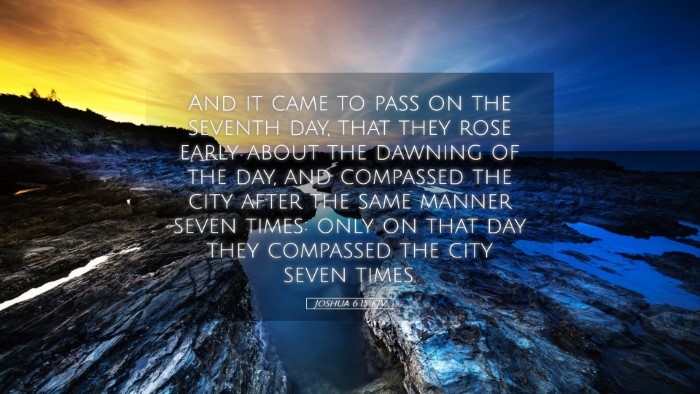Commentary on Joshua 6:15
Introduction
The conquest of Jericho is one of the most remarkable events narrated in the book of Joshua. It demonstrates God's sovereign power and the importance of faith and obedience. Joshua 6:15 reads:
"But it came to pass on the seventh day, that they rose early about the dawning of the day, and compassed the city after the same manner seven times: only on that day they compassed the city seven times."
This verse serves as a pivotal moment in the narrative, highlighting key themes that resonate throughout the Scriptures.
The Seventh Day: A Day of Fulfillment
The seventh day holds significant meaning within biblical literature, symbolizing completion and divine fulfillment. As noted by Matthew Henry, this day is a culmination of the Israelites' faithfulness in following God's commands.
The act of rising early emphasizes their readiness and determination to fulfill God’s instructions, reflecting a deep commitment to trust in His promises.
Albert Barnes adds that the command to march around Jericho seven times on this day represents both a test of faith and a completion of the preparation process before God’s mighty intervention. The spiritual significance of the number seven—denoting perfection and wholeness—echoes throughout Scripture.
It invites believers to recognize the patterns of God's faithfulness and the importance of sacred rhythms in worship and obedience.
The Act of Compassing the City: Obedience in Action
The act of surrounding the city reflects both trust and obedience to divine instruction. According to Adam Clarke, this methodology appears illogical from a human perspective; nevertheless, it served as a visible manifestation of their faith in the God of Israel.
The perseverance displayed by the Israelites exemplifies how faith often requires action that may not align with human reasoning.
Furthermore, Matthew Henry emphasizes that their obedient actions, day after day, laid the groundwork for a significant spiritual victory. Each circuit around Jericho became a testament to their reliance on God’s word, illustrating that obedience often precedes divine intervention.
The juxtaposition of mundane activity against the backdrop of miraculous outcomes teaches contemporary believers that faith is exercised through daily acts of obedience.
Spiritual Warfare: The Nature of True Victory
The narrative of Jericho is deeply embedded in the theme of spiritual warfare. As Albert Barnes notes, the conquest was not merely about military strategy but rather an illustrated principle of how God fights battles on behalf of His people.
The act of marching silently for days can be interpreted as a time of reflection, preparation, and spiritual readiness, essential prior to the outpouring of divine power.
Adam Clarke sheds further light on this struggle, suggesting that believers are still called to engage in spiritual battles today, using the tools provided by faith.
The implications of facing overwhelming odds, as the Israelites did with Jericho's fortified walls, resonate with believers experiencing personal battles. This verse encourages them to trust in God's guidance, even when victory appears improbable.
The Role of the Community in Faith
Community plays a vital role in the Israelites' victory over Jericho. Matthew Henry observes that their collective obedience creates a powerful synergy, emphasizing the strength found in unity when living out one’s faith.
Each member’s participation underscores the theological premise that believers are never alone in their journey; they are part of a larger narrative and a community of faith.
Albert Barnes reiterates that the Israelites’ cohesiveness during this process signifies the importance of accountability and encouragement among believers.
The collective movement around Jericho is reminiscent of the church’s mission today, where communities are called to march forward in faith against societal giants, partnering through prayer and collaborative efforts.
Conclusion
Joshua 6:15 encapsulates rich theological themes that are crucial for pastors, theologians, and students alike. The narrative invites deep reflection on faith, obedience, and the nature of divine intervention.
The lessons derived from the Israelites' experience at Jericho serve as a powerful reminder of God’s unwavering promises and the transformative power of collective faith.
The call to rise early, encapsulated in this verse, dares modern believers to prioritize their spiritual lives, engaging actively with the divine through obedience and communal worship.
As they navigate challenges, they are reminded that God is ultimately the architect of victory, working through their faithful acts—however mundane they might seem—to bring about miraculous outcomes.


